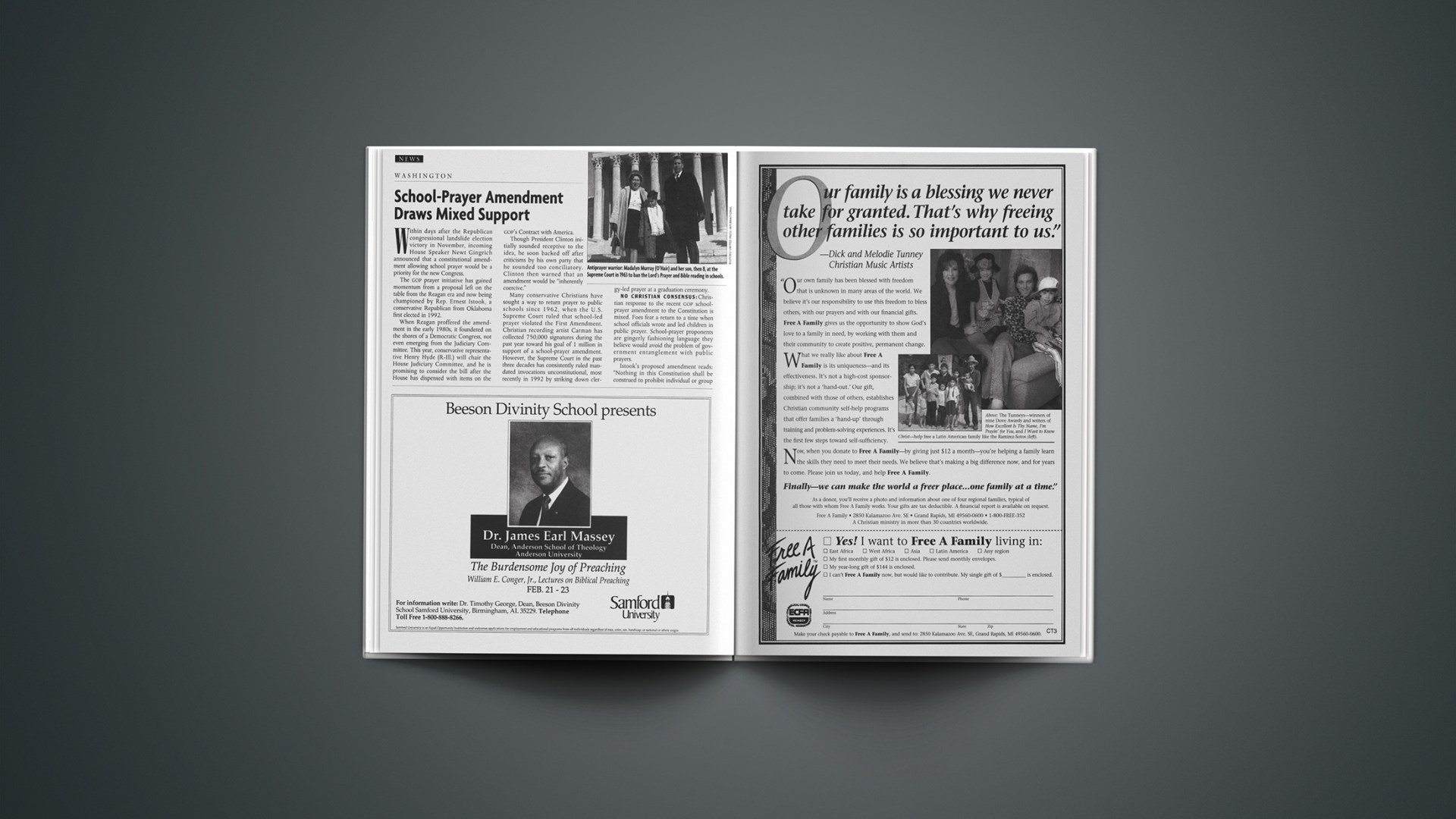Within days after the Republican congressional landslide election victory in November, incoming House Speaker Newt Gingrich announced that a constitutional amendment allowing school prayer would be a priority for the new Congress.
The GOP prayer initiative has gained momentum from a proposal left on the table from the Reagan era and now being championed by Rep. Ernest Istook, a conservative Republican from Oklahoma first elected in 1992.
When Reagan proffered the amendment in the early 1980s, it foundered on the shores of a Democratic Congress, not even emerging from the Judiciary Committee. This year, conservative representative Henry Hyde (R-Ill.) will chair the House Judiciary Committee, and he is promising to consider the bill after the House has dispensed with items on the GOP's Contract with America.
Though President Clinton initially sounded receptive to the idea, he soon backed off after criticisms by his own party that he sounded too conciliatory. Clinton then warned that an amendment would be "inherently coercive."
Many conservative Christians have sought a way to return prayer to public schools since 1962, when the U.S. Supreme Court ruled that school-led prayer violated the First Amendment. Christian recording artist Carman has collected 750,000 signatures during the past year toward his goal of 1 million in support of a school-prayer amendment. However, the Supreme Court in the past three decades has consistently ruled mandated invocations unconstitutional, most recently in 1992 by striking down clergy-led prayer at a graduation ceremony.
NO CHRISTIAN CONSENSUS: Christian response to the recent GOP school-prayer amendment to the Constitution is mixed. Foes fear a return to a time when school officials wrote and led children in public prayer. School-prayer proponents are gingerly fashioning language they believe would avoid the problem of government entanglement with public prayers.
Istook's proposed amendment reads: "Nothing in this Constitution shall be construed to prohibit individual or group prayer in public schools or other public institutions. No person shall be required by the United States or by any state to participate in prayer. Neither the United States nor any state shall compose the words of any prayer to be said in public schools."
Istook says Americans already pray at public events in what he calls a massive level of civil disobedience. Recent state government attempts to legalize moments of silence in schools are "only effective until the local [American Civil Liberties Union] decides to shut it down," he told CHRISTIANITY TODAY.
Galvanizing much of the amendment's support is a belief that only a constitutional change can reverse a perceived antireligious bias in public institutions. The Supreme Court is using the Constitution "as a weapon" against people who want to express their religious convictions, Istook says.
"We don't see [an amendment] as the be-all and end-all of the problem," says Timothy Crater, a spokesman for the National Association of Evangelicals (NAE) in Washington, D.C. "Frankly, it won't change the more fundamental problem of 30 years of negative environment for religion in the schools."
PROTECTING MINORITY RIGHTS: Crater says the First Amendment has been used as a "search-and-destroy mandate against religion." Yet not all Christians say that. One group that has forcefully opposed the amendment is the Baptist Joint Committee (BJC), which said that "at worst, it would threaten religious freedom." BJC joined other religious organizations, ranging from mainline denominations to American Jewish groups, on November 22 in Washington to express trepidation that an amendment would be a coercive and inappropriate move by the government.
"Once again, prayer has been turned into a political football," says J. Brent Walker, BJC general counsel. He says students already have the right to pray. "When government gets into making laws and amending constitutions on this issue, it inevitably gets to trivializing prayer."
Ever since prayer has been removed from public schools, public opinion polls have shown that huge majorities favor its return. A postelection Times Mirror Center poll reported that 74 percent of Americans support a constitutional amendment allowing prayer.
"The devil's in the details," says Richard Land, executive director of the Southern Baptist Convention Christian Life Commission in Nashville. He is cautious about expressing support for school-prayer amendments, but he—like so many others in the debate—thinks something is needed on a constitutional level to protect religious expression.
"The kind of prayer amendment that we would support—and it's the only amendment we would support—would guarantee the individual student's rights," Land says. "We are opposed to the state sponsorship of religion that prevailed in our schools prior to 1963. We're also opposed to a suppression of religious expression in our schools."
There are also divergent views about whether an amendment would be able to meet the necessary two-thirds vote requirement from Congress and three-fourths majority from state legislatures to become law. NAE counsel Forest Montgomery—who warns against getting "Caesar in the prayer business"—expects GOP leadership to keep up the fight, however.
Copyright © 1995 Christianity Today. Click for reprint information.










